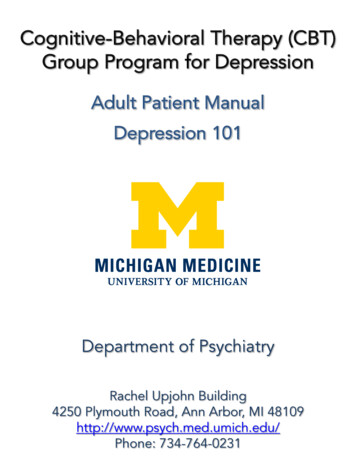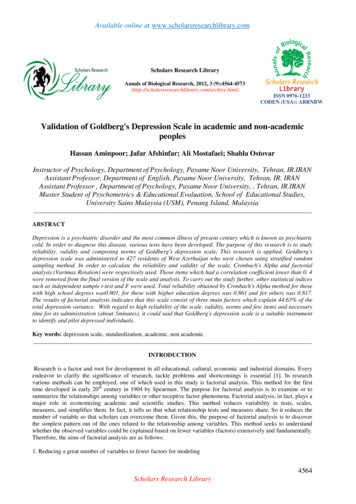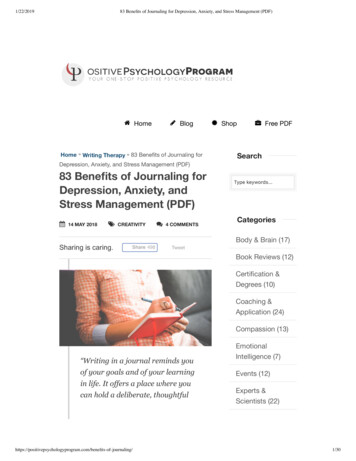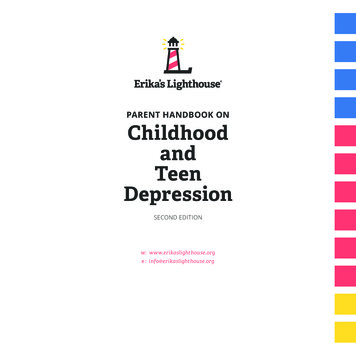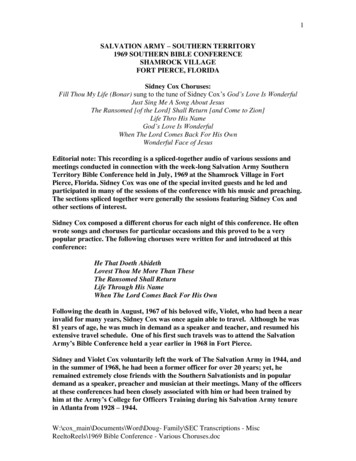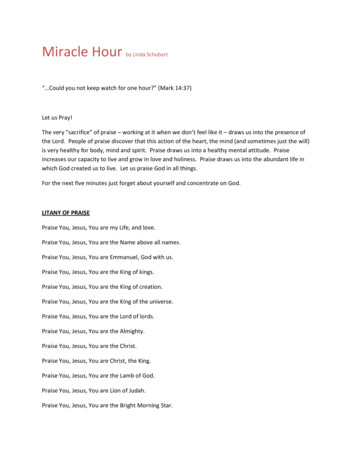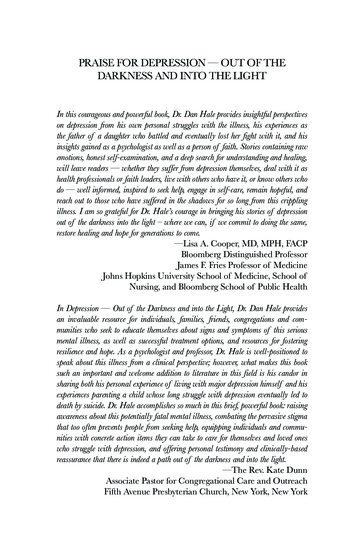
Transcription
PRAISE FOR DEPRESSION — OUT OF THEDARKNESS AND INTO THE LIGHTIn this courageous and powerful book, Dr. Dan Hale provides insightful perspectiveson depression from his own personal struggles with the illness, his experiences asthe father of a daughter who battled and eventually lost her fight with it, and hisinsights gained as a psychologist as well as a person of faith. Stories containing rawemotions, honest self-examination, and a deep search for understanding and healing,will leave readers — whether they suffer from depression themselves, deal with it ashealth professionals or faith leaders, live with others who have it, or know others whodo — well informed, inspired to seek help, engage in self-care, remain hopeful, andreach out to those who have suffered in the shadows for so long from this cripplingillness. I am so grateful for Dr. Hale’s courage in bringing his stories of depressionout of the darkness into the light – where we can, if we commit to doing the same,restore healing and hope for generations to come.—Lisa A. Cooper, MD, MPH, FACPBloomberg Distinguished ProfessorJames F. Fries Professor of MedicineJohns Hopkins University School of Medicine, School ofNursing, and Bloomberg School of Public HealthIn Depression — Out of the Darkness and into the Light, Dr. Dan Hale providesan invaluable resource for individuals, families, friends, congregations and communities who seek to educate themselves about signs and symptoms of this seriousmental illness, as well as successful treatment options, and resources for fosteringresilience and hope. As a psychologist and professor, Dr. Hale is well-positioned tospeak about this illness from a clinical perspective; however, what makes this booksuch an important and welcome addition to literature in this field is his candor insharing both his personal experience of living with major depression himself and hisexperiences parenting a child whose long struggle with depression eventually led todeath by suicide. Dr. Hale accomplishes so much in this brief, powerful book: raisingawareness about this potentially fatal mental illness, combating the pervasive stigmathat too often prevents people from seeking help, equipping individuals and communities with concrete action items they can take to care for themselves and loved oneswho struggle with depression, and offering personal testimony and clinically-basedreassurance that there is indeed a path out of the darkness and into the light.—The Rev. Kate DunnAssociate Pastor for Congregational Care and OutreachFifth Avenue Presbyterian Church, New York, New York
Dr. Hale’s book, Depression – Out of the Darkness and Into the Light, will capturethe hearts, minds and spirits of those who suffer with depression and the familymembers and friends who care for them. By being transparent and vulnerable as hewrites about his personal struggles with depression and the many difficult challengeshe experienced caring for a daughter who eventually lost her life to this terrible illness,he opens a new avenue for people to understand and speak more freely about similarexperiences. Readers will leave feeling a sense of camaraderie with the author. Thisbook also can serve as a valuable resource for clergy and laity who feel called tominister to those impacted by depression.—The Rev. Debra HickmanCo-Founder/CEO of Sisters Together And Reaching (STAR)Baltimore, MarylandAny number of books on depression are available for the interested reader. However,many are dry and technical. This book, Depression – Out of the Darkness andinto the Light, is quite different. It is a powerful and personal story about one man’sjourney through bouts of depression and the suicide of his daughter. His experiencesare vivid and poignant; he urges folks to talk openly about depression. Readers willfind a deep and abiding understanding of disordered moods and thoughts in hiseminently readable and clear insights. At the same time, the book offers descriptionsof depression, its symptoms and treatment. It will appeal to family members andfriends of a depressed person who are anxious to know how they may be of help.With its extensive list of resources to combat depression, it will be especially usefulto members of faith communities and other institutions that can mobilize their members to recognize and be supportive of their depressed colleagues.—Bonnie R. Strickland, PhD.Professor of Psychology Emerita, Universityof Massachusetts AmherstFormer President, American Psychological AssociationDr. Hale’s book is grounded by professional training, but is profoundly accessible,personal, and readable through his stories. Although he is a trained psychologist,the author does not stand on a ledge of professional language as if he’s lookingat someone in a pit. Instead, he not only shares his own personal experience withdepression and his experience regarding a beloved daughter with depression, we areinvited to journey with him. We hear his own times of anguish and come out onthe other side with concrete recommendations for treatments and support systems.In this meaningful work, readers learn the author’s personal impetus for writingand then learn answers to many questions regarding the shadow of clinical depression. It is a complicated and elusive condition. Dr. Hale was especially helpful in
describing the distorted worldview that depressed persons exhibit. Open this bookand instantly be drawn into the stories and the descriptions — some raw and somegentle — regarding the conditions and treatments of clinical depression. Thisbook is well worth the read.—The Rev. Dr. Jeffrey SumnerSenior Pastor, Westminster By-The-Sea Presbyterian ChurchDaytona Beach Shores, FloridaDan Hale has written a book that is extremely readable, but chock-full of excellentadvice and information for anyone living with depression or anyone who cares abouta family member, friend, or colleague living with depression. It is also an importantbook for faith communities as they seek to find ways to support congregants withdepression and to educate others on ways to help. By intertwining the personal storyof how depression impacted him, as well as the tragic loss of his daughter to thedisease, Dr. Hale speaks with authenticity as a mental health clinician, a respectededucator, and a loving father. His is a story that begs to be shared.—Sherry WelchFormer Executive Director, NAMI Metropolitan BaltimoreDr. Hale pulls back the curtain for his readers and allows them in the painfulplaces of his life. He is transparent in the telling of his personal depressive episodes and he shares with a father’s heart the sad story of his daughter’s depressionand the pain that came when the illness ultimately took her life. This book is aninspirational and faithful account of a family’s walk through the dark valley ofdepression. It removes the mysteries associated with depression and reveals it forthe ugly and sometimes dangerous monster that it is. In this book, the reader canfind tools to assist them in recognizing the symptoms of depression, direction infinding the right mental health professionals to help one navigate the complexitiesof the illness, and hope for the recovery process. The book is written in a clearand easy-to-understand way and will be a good read for lay persons and professionals alike. I applaud Dr. Hale for his ability in blending his father’s heart andhis professional knowledge together to bring the subject of depression out of thedarkness and into the light.—The Rev. Pamula Yerby-HammackAssistant Pastor,City of Abraham Church and MinistriesBaltimore, Maryland
Out of the Darknessand Into the LightW. DANIEL HALE, PhDColumbus, Ohio
Depression - Out of the Darkness and Into the LightPublished by Gatekeeper Press2167 Stringtown Rd, Suite 109Columbus, OH 43123-2989www.GatekeeperPress.comCopyright 2020 by W. Daniel Hale, PhDAll rights reserved. Neither this book, nor any parts withinit may be sold or reproduced in any form or by any electronic or mechanical means, including information storageand retrieval systems without permission in writing fromthe author. The only exception is by a reviewer, who mayquote short excerpts in a review.ISBN (paperback): 9781642375756eISBN: 9781642374711
Other Books by W. Daniel HaleBuilding Healthy Communities ThroughMedical-Religious Partnershipswith Richard G. Bennett and Panagis GaliatsatosHealing Bodies and Souls: A Practical Guide for Congregationswith Harold G. Koenig
To Libby
CONTENTSIntroduction .11. A Personal Perspective . 112. A Professional’s Perspective . 253. A Father’s Perspective . 474. Recognizing and Responding to Depression . 775. Caring for a Loved One . 996. Ministering to the Vulnerable Among Us . 1097. Resources . 117
INTRODUCTIONNothing could have prepared me for the brief talk Iwas to give that January evening at the church wheremy family and I had worshipped for more than threedecades. Not my years of lecturing to college classes. Not mymany presentations at professional conferences and community forums. This was a talk I had never given before — andone that every parent hopes they never have to give.I was there to offer reflections on the life and death ofmy 36-year-old daughter, Libby, who had passed away justa few days before. As I prepared my remarks, Libby’s sisterand brother offered valuable guidance. They encouragedme to speak openly about the illness responsible for herdeath. If she had died of cancer, they noted, we would notbe reluctant at all to talk about her battles and eventualdeath from it. But it was not cancer that took Libby fromus. It was another terrible disease — depression.Depression was not unfamiliar to me. I am a clinicalpsychologist and have devoted much of my research and1
W. DANIEL HALE, PhDclinical work to mood disorders. And I’ve also had personalexperience with depression, having had two serious episodes that required medical and psychological treatment.As I looked out at hundreds of people attending thememorial service that evening, I didn’t know what type ofresponse I would get to my remarks about Libby’s struggleswith depression and how she had taken her own life. ButI felt strongly that I owed it to Libby and to all those stillsuffering with depression to use this dark moment in mylife to shed light on this crippling and often lethal illness.I must confess that I was surprised by just how manypeople spoke to my children and me after the service toexpress appreciation for my remarks – their words spokenwith sincerity and purpose. The refrain, “We need to talkabout depression,” was repeated over and over again inthese conversations. “We need to talk about depression inour schools.” “We need to talk about depression in the workplace.” “We need to talk about depression in our homes.”“We need to talk about it in our churches.”I was truly touched by these comments, and especiallymoved over the next few weeks when I learned that manyof these concerned individuals made generous donations tosupport the production of an educational video on depression that we chose to title, “We Need to Talk: A Story ofLoss and Hope.”Since Libby’s death, I have had many opportunitiesto share this video and to speak about depression in educational institutions, workplaces and religious congregations.Because of my longstanding interest in the intersection offaith and health, I was especially pleased to be invited to2
DEPRESSIONpresent at programs offered in faith communities. Theseprograms were always well attended, and the audienceswere always highly engaged. People came to learn, butthey also came to share. They often talked about their ownstruggles with depression and how it had impacted theirwork, their relationships and even their faith. They spokeof periods when they felt completely worthless and helpless. They shared how, during these times, nothing in theirlife brought them any joy and how they could not imagineever feeling hopeful about life again. Some even confessedto thinking at times about taking their own life. And manymentioned how this was the first time they had spokenopenly to anyone about their depression.The questions they asked also reflected a high degreeof interest and concern. When does depression become soserious that it requires professional care? How does depression differ from grief ? From stress? What treatments areavailable for depression?Others who attended these programs came becausethey wanted to learn how to help a family member orfriend who might be depressed. Sometimes the first thingthey wanted to know was how to tell if a person is seriouslydepressed. What should they be looking for? Some wantedadvice on how they could encourage their loved one toseek treatment. Besides helping them get professional care,what could they say and do to support them during thedepths of their depression, before treatment takes effect?And many were concerned about the stress and strain theyfelt caring for someone who is depressed. What could they3
W. DANIEL HALE, PhDdo so that their loved one’s depression didn’t drag themdown into their own depression?I also found it gratifying that at many of these programs there were individuals who were there not becausethey suffered from depression or had a loved one who did,but because they felt it was important for their congregation to minister to individuals and families affected bydepression. What were some of the special challenges religious congregations might face as they try to identify andreach out to individuals who might be depressed? Whatcould they do to erase the stigma that still is often associated with depression and that can serve as a barrier to seeking treatment? How could both clergy and laity reach outand support families who have lost a loved one to suicide?As I gave these presentations, I learned how valuableit was for me to speak not only as a psychologist but also assomeone who has suffered from depression and is willing totalk candidly about my own experiences. Again and again,I heard that talking about my own symptoms gave people aclearer and more in-depth understanding of what depression looked and felt like. But I found that there were otherbenefits to being open about my experience. People commented on how encouraging it was to hear someone speakabout their own experiences with depression without anysense of shame or embarrassment. And they also spoke ofhow heartening it was to see someone who had been seriously depressed recover from the illness and return to anactive life, full of love, joy and hope.I also found that there was an appreciation for mywillingness to speak from the heart about my daughter’s4
DEPRESSIONstruggles with depression and the many challenges familymembers faced as we tried to help Libby get the care andsupport she needed.It was because of what I heard in these gatherings andin numerous conversations I have had with both clergy andconcerned members of faith communities that I felt called towrite Depression – Out of the Darkness and Into the Light. I heardrepeatedly that there is a need in congregations in everycommunity for more information about depression. Thereare people of faith struggling with depression whoThere are people of faithstruggling with depression whoneed to know that theyneedto know that they are notare not alone and thatalone and that there is hope.there is hope. They needto know that their illnessis not the result of a lack of faith or personal weakness. Theyneed trustworthy information about the steps they can taketo help them climb out of the dark depths of depression andinto the light. And there are those who have loved ones suffering from depression and who need guidance about whatthey can say and do to be of help, and how to take care ofthemselves as they support their loved one.There is also a need among concerned clergy andlaity for information about how to minister to individualsand families affected by depression, in their congregationsand their communities. What materials and resources areavailable? How can they work with health professionals inthe community? How can they improve access to mentalhealth services? These are the questions and concerns thatguided me as I prepared Depression – Out of the Darkness andInto the Light.5
W. DANIEL HALE, PhDChapter 1A PERSONAL PERSPECTIVEIn this chapter, I offer an inside look at major depression,sharing what it was like for me – the overwhelming sadness,the loss of interest in things that had always brought megreat joy, the terrible sleepless nights, the loss of my appetite,the constant state of exhaustion, the sense of worthlessness,the difficulty concentrating, the thoughts of death I couldnot get out of my mind, and a persistent sense of hopelessness. For those who have experienced depression, much ofthis should be familiar. For those who have not ever beendepressed, this should give you a better idea of the devastating impact depression can have on almost every aspect of aperson’s life.Chapter 2A PROFESSIONAL’S PERSPECTIVEI’m often asked why I have focused on depression for mostof my career. Occasionally, a person will add, “Isn’t itdepressing to work with individuals suffering from depression?” In this chapter, I explain why I was drawn to depression at the beginning of my career and why, after more thanforty years, I still find the work so rewarding and uplifting. Ialso share some of the encouraging lessons I have learnedabout depression, first as a psychotherapist and then laterworking with religious congregations to provide individuals suffering from depression with the information theyneed to recognize their condition, overcome any sense of6
DEPRESSIONembarrassment or shame about their illness, and seek professional care and the support of family and friends.Chapter 3A FATHER’S PERSPECTIVEBy the time Libby, our oldest child, reached the age often, she had established herself as one of the fastest youngswimmers in the country. It wasn’t unrealistic to think thatsomeday she might swim in the Olympics. Like manyof the girls she competed with who eventually becameOlympians, Libby had the determination, drive and discipline it takes to succeed. But Libby’s teenage years broughtnew challenges that derailed those ambitions. The mostserious challenge came when she experienced the first ofwhat would turn out to be several episodes of depression.Although she would recover from this initial episode, laterepisodes would prove to be more severe. It was during theselater episodes that I experienced the painful frustration Ihad heard other parents talk about when they saw theiradult children struggling with depression and other mentalillnesses. You want to rush in and do everything you canto help them and to make sure they get the best possiblecare, but often you encounter limitations and obstacles youdidn’t have when they were younger and living under yourroof. In this chapter, I discuss our efforts – some successfuland others unsuccessful – to help Libby receive the careand support she needed and the lessons we learned fromthose experiences.7
W. DANIEL HALE, PhDChapter 4RECOGNIZING AND RESPONDING TO DEPRESSIONWhile it is clear that depression is a painful and potentiallylethal illness, there also is good news that needs to be shared– it is a highly treatable condition. However, far too manypeople who suffer from depression fail to receive effectivetreatment. One of the most common reasons is becauseindividuals fail to recognize they are depressed. They mayknow that something is wrong, but they don’t realize thatwhat they are going through is a serious illness. In this chapter, I review the most common symptoms of depression anddiscuss how a diagnosis is made. After addressing additionalbarriers to treatment, I review treatment strategies andoptions, including the two most common approaches -- antidepressant medication and psychotherapy. I also share myown experiences working with my family physician, psychiatrist and psychologist during my two depressive episodes.Chapter 5CARING FOR A LOVED ONECaring for a loved one who is depressed can be challenging.You may find yourself experiencing confusion, frustrationand a sense of helplessness. Some of the things depressedindividuals say and do can be difficult to understand,and even hurtful. Because depression can have a serious,far-reaching impact on a person’s attitudes, thoughts andbehaviors, it’s important for family members and friends toeducate themselves as much as they can about this condi8
DEPRESSIONtion. In this chapter, I discuss how they can help their lovedone receive the care, encouragement and support theyneed; how to recognize and respond to the risk of suicide;and the importance of self-care. I also share some examples of the valuable guidance, encouragement and supportI received from family and friends during my darkest times.Chapter 6MINISTERING TO THE VULNERABLE AMONG USOne of the principal teachings of my faith is our responsibility to care for the most vulnerable among us. Growingup, the focus on caring for the vulnerable and sufferingalways meant reaching beyond the walls of the church. Itdidn’t occur to me to also look inside the church. It wasn’tuntil I began working with the seriously depressed that Irealized many of the individuals experiencing the greatestsense of vulnerability and despair are sitting in our churchpews on Sunday mornings, suffering in silence. In thischapter, I discuss how we can work toward creating communities where individuals experiencing the crippling painand despair of depression can feel safe turning to theirclergy and fellow congregants, confident they will receivethe understanding, guidance and support they need.Chapter 7RESOURCESIndividuals experiencing depression, those who have aloved one suffering from depression and members of faith9
W. DANIEL HALE, PhDcommunities interested in ministering to those impactedby depression will find a wealth of resources in this chapter.Listed are organizations that offer online tools, fact sheets,brochures, classes, support groups and crisis services.10
CHAPTER 1A Personal Perspective“Iam truly blessed!” That is exactly what I thought— and often what I said out loud to myself —almost every day for the first 38 years of my life.Whether it was a weekday or the weekend, I knew my daywould include a number of activities that I would thoroughly enjoy. This was especially true once I completed mytraining as a clinical psychologist and landed my dream jobas a professor at Stetson University. I loved going to campus every day where I had the opportunity to work withbright, energetic students who were eager to learn aboutpsychology and to use that knowledge to help others. And Iwas fortunate to have exceptional colleagues who providedplenty of intellectual stimulation and who were alwaysthere to support me, both professionally and personally.Even during the most stressful periods in my life, Iknew I could find pleasure in at least some of my dailyendeavors. And I certainly could count on enjoying mytime with family and friends. But all that changed dramati11
W. DANIEL HALE, PhDcally when I found myself spiraling down into a deep, darkdepression following a painful divorce. I had experiencedperiods of sadness before, but this was entirely different.I found that I no longer enjoyed being in the classroom,even when I was teaching my favorite courses. Nor did Ienjoy meeting individually with students as they discussedtheir course projects or explored career options or sharedexciting personal accomplishments. Conversations withcolleagues over lunch or coffee had lost their appeal, as hadweekly volleyball games with the other professors. To put itsimply, I had lost interest in all aspects of my work life thatpreviously had been so appealing and gratifying.My inability to find any joy in activities that had previously brought me such great pleasure and a sense of fulfillment extended to my home life. I certainly didn’t lovemy wonderful children – Libby (age 12), Graham (10) andWill (6) – any less, and I never forgot for even a momenthow fortunate I was to have these three amazing children.I just couldn’t enjoy my time with them the way that I hadbefore. The things we had always liked doing together –taking bike rides, tossing a Frisbee, shooting baskets or justwatching television – were no longer fun for me. I couldn’tgenerate the least little bit of enthusiasm for any of theseactivities. And our dinners, which had always been a timefor lively conversations and kidding around, had turnedinto somber affairs – at least for me.Once the children were asleep, the hours dragged byever so slowly. I couldn’t find anything that I enjoyed or thatwould distract me from focusing inwardly on my miseryand despair. Reading was no longer an option. Books that12
DEPRESSIONI previously would have found fascinating or inspiring nolonger interested me, especially since depression affectedmy ability to concentrate on what I was reading. Televisionwas an option, but there wasn’t anything I actually enjoyedwatching. I couldn’t find any programs that would lift myspirits or even amuse me. In fact, when watching a comedy or listening to what was obviously a very funny joke, Icouldn’t even laugh. I would know intellectually that whatI had heard or seen was genuinely funny, but I couldn’t feelthe humor.My typical weekend activities also lost most of theirappeal. I continued to attend swim meets and ballgamesthat involved my children, but they weren’t the fun socialevents they previously had been. I didn’t enjoy talking tothe other parents, and I couldn’t feel any of the excitementthat I saw in others as we watched our children compete inthe pool or on the field.My depression also impacted my Sundays. Churchhad been a very important and gratifying part of my lifefor as long as I could remember. Growing up, my familyand I were at our church every Sunday morning and mostWednesday evenings. In recent years, I had looked forwardnot only to worship services but also to one of the adultSunday school classes. Led by a brilliant attorney with alifelong interest in religion and what seemed like a photographic memory for everything he had ever read on thesubject, I could count on lively, informative discussionsevery week. It was also in this class that I had formed someof my best friendships. But once my depression set in, Ino longer looked forward to attending the Sunday school13
W. DANIEL HALE, PhDclass or the worship service. I felt uncomfortable and outof place sitting among people who were obviously enthusiastic about their faith while I was mired in my dark, joylessdepression, so I often opted to stay home instead.Depression also robbed me of my ability to enjoy oneof life’s most basic pleasures – eating. My appetite wascompletely shot. Nothing appealed to me. Not even thetastiest snacks and desserts. I managed to prepare or bringhome our favorite meals when my children were with me,but I couldn’t enjoy what I was eating and usually failedto finish my dinner. When the children weren’t with me,I didn’t feel like fixing a full, healthy meal. Nor did I feellike going out to a restaurant, fearing that I might run intosomeone I knew who would want to talk to me. So I oftenskipped meals or just warmed up a can of soup. With suchpoor, erratic eating habits, I started losing weight, and bythe time my depression hit full force, I had lost more thanten pounds.In addition to losing interest in everything that hadpreviously been so enjoyable – my favorite people, activities and even food – Iexperienced a profoundI experienced a profound sadsadness that was moreness that was more painful anddebilitating than anything Ipainful and debilitatinghad ever experienced before.than anything I had everexperienced before. Thissadness was, in some respects, similar to what I had felt as Igrieved the deaths of my parents just a few years earlier, butit differed in intensity and in a couple other ways. Even inthe midst of grieving those losses, there were periods when14
DEPRESSIONI could reminisce with my sister about the many good timeswe had with our parents, such as our frequent vacations tonational parks where the four of us would marvel at some ofGod’s most magnificent creations. We had warm, wonderful memories of the Great Smoky Mountains, Yellowstone,Yosemite, Grand Teton, Carlsbad Caverns and an extraordinary trip all the way to the bottom of the Grand Canyon.Despite the grief I felt, I still was able to reflect on all thatthey had done for me and appreciate just how blessed I wasto have had them as parents, friends and mentors. I couldsay to myself, even as I mourned their passing, “I’m truly avery lucky person.” But with my depression, there was neverany reprieve from the painful sadness. It was a constant, andit kept me from thinking and feeling positively about anything from my past or anything that might lie ahead.Also, as profoundly saddened as I was that my parents would no longer be there to provide me with theirwisdom and guidance and to join me in rooting for Libbyat her swim meets or Will at his baseball games or to enjoyGraham’s piano recitals, their absence did not alter howI felt about myself. I still thought of myself as basically agood and fortunate person. But with the depression, I feltfundamentally changed. I was no longer confident aboutmy value as a person, and I certainly did not feel that Icould be counted among the fortunate in this world.Another symptom of my depression, and certainlyone of the worst parts of my experience, was the extremedifficulty I had sleeping.
Dr. Hale’s book, Depression – Out of the Darkness and Into the Light, will capture the hearts, minds and spirits of those who suffer with depression and the family members and friends who care for them. By being transparent and vulnerable as he writes about his personal st
